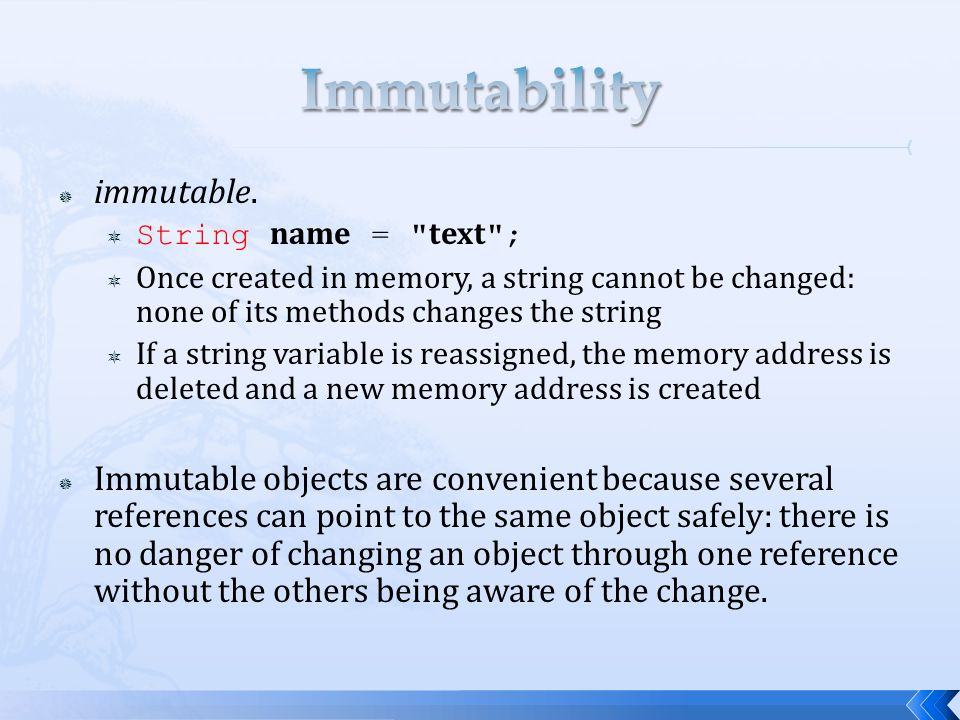What Is Immutable Strings and Exactly How It Functions
In the world of programming, understanding the concept of immutable strings is vital for producing robust and secure applications. Immutable strings refer to strings that can not be changed after they are produced, ensuring information stability and predictability within the code. This essential principle plays a crucial function in different programming languages and provides a distinct approach to dealing with data. By checking out the details of just how immutable strings work, one can reveal a world of advantages and opportunities that can elevate the quality and efficiency of software program advancement.
The Fundamentals of Unalterable Strings
Immutable strings, as an essential principle in programming, are personality sequences that can not be altered as soon as they are developed. This implies that as soon as a string is appointed a value, that value can not be modified. In languages like Python and Java, strings are immutable objects, causing different implications in regards to memory administration and information integrity.
Among the vital advantages of unalterable strings is that they offer a complacency in data adjustment. Because the web content of an unalterable string can not be modified, it makes sure that the original information stays intact, minimizing the risk of unexpected modifications throughout program implementation (Why are strings immutable in Java?). This residential property also streamlines debugging processes, as designers can rely on that as soon as a string is specified, its worth will certainly not be accidentally changed
When a brand-new string is developed based on an existing one, rather than customizing the initial string, the brand-new worth is saved separately. In general, comprehending the fundamentals of unalterable strings is critical for understanding shows principles and maximizing code performance.
Benefits of Unalterable Strings
Structure upon the protection and performance benefits of unalterable strings, their benefits include enhancing code integrity and simplifying simultaneous programming jobs. By being immutable, strings can not be changed after development, which removes the threat of unintended modifications in the information they save. This fundamental immutability ensures that once a string is developed, its value continues to be consistent throughout the program's execution, decreasing the chances of insects triggered by unforeseen changes.
Additionally, unalterable strings add to code reliability by making it simpler to reason concerning the state of a program. Given that strings can not be altered, designers can rely on that a string will always hold the exact same worth, streamlining debugging and upkeep initiatives. This predictability results in much more stable and trustworthy codebases.

Implementation in Programming Languages
Within various programs languages, the consolidation of immutable strings is an essential element that impacts how data is handled and controlled within code frameworks. The implementation of unalterable strings varies throughout various shows languages, with each language providing its own devices to sustain this concept.

On the other hand, languages like C and C++ do not have built-in assistance for unalterable strings. Designers in these languages need to manually execute immutability by enforcing policies within their code to avoid straight modifications to string objects.
Best Practices for Functioning With Immutable Strings
When dealing with unalterable strings in programs languages like Java and Python, sticking to finest practices makes certain efficient and protected information manipulation. Among the key best methods is to make use of StringBuilder or StringBuffer rather than straight controling strings, specifically when taking care of substantial concatenation procedures. These classes provide mutable options for string manipulation, helping to prevent unneeded memory allowances and enhancing performance.
In addition, when functioning with delicate data such as passwords or API tricks, it is crucial to avoid storing them as ordinary text in unalterable strings. Making use of protected storage space mechanisms like char varieties or specialized libraries for managing sensitive details helps alleviate protection risks associated with unalterable strings.
Real-world Applications and Examples
Exploring functional executions of unalterable strings in different industries reveals their substantial effect on information integrity and system dependability. In the health care market, immutable strings play a critical function in making sure the safety and security and confidentiality of individual information. By stopping unauthorized alterations to sensitive info such as medical records and prescriptions, immutable strings aid keep compliance with stringent personal privacy regulations like HIPAA.
Financial institutions also profit from the immutable nature of strings to improve the safety and security of consumer information and deal records. Unalterable strings assist Check This Out stop fraud and see this unauthorized changes to economic information, offering a robust defense against cyber hazards and making certain the count on and confidence of clients.
Conclusion
In conclusion, unalterable strings are taken care of and stable sequences of personalities that offer benefits such as thread safety and boosted efficiency in programming. They are executed in various programs languages to ensure information stability and security. Finest practices for working with immutable strings include preventing direct adjustments and using techniques that return brand-new string items. Real-world i thought about this applications of unalterable strings consist of data security, caching, and string adjustment jobs.
Immutable strings refer to strings that can not be modified after they are created, making sure data stability and predictability within the code. When a brand-new string is created based on an existing one, rather than customizing the initial string, the new value is kept individually.In languages like Java and Python, strings are immutable by default, suggesting that when a string item is produced, its worth can not be changed - Why are strings immutable in Java?. Ideal techniques for functioning with immutable strings include avoiding direct adjustments and using methods that return brand-new string items. Real-world applications of immutable strings consist of information encryption, caching, and string control tasks
Comments on “Why Are Strings Immutable in Java? Safety And Security and Performance Conveniences”